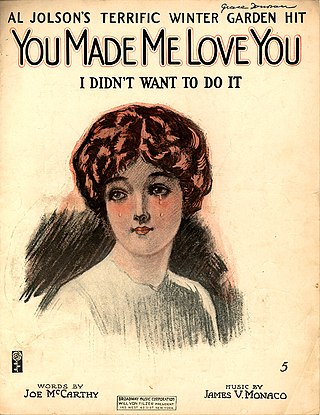
Maria do Carmo Miranda da Cunha, known professionally as Carmen Miranda, was a Portuguese-born Brazilian singer, dancer, and actress. Nicknamed "The Brazilian Bombshell", she was known for her signature fruit hat outfit that she wore in her American films.

The Three Caballeros is a 1944 American live-action and animated musical propaganda anthology film produced by Walt Disney and released by RKO Radio Pictures. The film premiered in Mexico City on December 21, 1944. It was released in the United States on February 3, 1945 and in the United Kingdom in March 1945. It marks the tenth anniversary of Donald Duck and plots an adventure through parts of Latin America, combining live-action and animation. This is the second of the six package films released by Walt Disney Productions in the 1940s, following Saludos Amigos (1942). It is also notable for being one of the first feature-length films to incorporate traditional animation with live-action actors.

Christmas music comprises a variety of genres of music regularly performed or heard around the Christmas season. Music associated with Christmas may be purely instrumental, or in the case of carols, may employ lyrics about the nativity of Jesus Christ, traditions such as gift-giving and merrymaking, cultural figures such as Santa Claus, or other topics. Many songs simply have a winter or seasonal theme, or have been adopted into the canon for other reasons.

The Andrews Sisters were an American close harmony singing group of the swing and boogie-woogie eras. The group consisted of three sisters: contralto LaVerne Sophia Andrews (1911–1967), soprano Maxene Anglyn Andrews (1916–1995), and mezzo-soprano Patricia Marie Andrews (1918–2013). The sisters have sold an estimated 80 million records. Their 1941 hit "Boogie Woogie Bugle Boy" can be considered an early example of jump blues. Other songs closely associated with the Andrews Sisters include their first major hit, "Bei Mir Bist Du Schön " (1937), "Beer Barrel Polka " (1939), "Beat Me Daddy, Eight to the Bar" (1940), "Don't Sit Under the Apple Tree " (1942), and "Rum and Coca-Cola" (1945), which helped introduce American audiences to calypso.

Mary Hopkin, credited on some recordings as Mary Visconti from her marriage to Tony Visconti, is a Welsh singer best known for her 1968 UK number 1 single "Those Were the Days". She was one of the first artists to be signed to the Beatles' Apple label.

Darlene Wright ,[a] also known by the stage name Darlene Love, is an American R&B and soul singer and actress. She was the lead singer of the girl group the Blossoms and also a solo recording artist.

"A Nightingale Sang in Berkeley Square" is a British romantic popular song written in 1939 and published in 1940, with lyrics by Eric Maschwitz and music by Manning Sherwin.
"Delicado" is a popular song published in 1952 with music by Waldir Azevedo and lyrics by Jack Lawrence. The song reached the top of the Billboard charts in 1952.

"The Chipmunk Song (Christmas Don't Be Late)" is a 1958 novelty Christmas song written and recorded by Ross Bagdasarian (under the stage name of David Seville). Bagdasarian sang the song, varying the tape speeds to produce high-pitched "chipmunk" voices, with the vocals credited to Alvin and the Chipmunks, Seville's cartoon virtual band and later media franchise. The song was nominated for Record of the Year in the 1st Annual Grammy Awards, where it also won three Awards.
Ashley Lauren Monroe is an American country music singer-songwriter.

Words for the Dying is the twelfth solo studio album by the Welsh musician John Cale, released in 1989 by record labels Opal and Warner Bros.

"You Made Me Love You (I Didn't Want to Do It)" is a popular song from 1913 composed by James V. Monaco with lyrics by Joseph McCarthy. It was introduced by Al Jolson in the Broadway revue The Honeymoon Express (1913), and used in the 1973 revival of the musical Irene.

Springtime in the Rockies is an American Technicolor musical comedy film released by Twentieth Century Fox in 1942. It stars Betty Grable, with support from John Payne, Carmen Miranda, Cesar Romero, Charlotte Greenwood, and Edward Everett Horton. Also appearing were Grable's future husband Harry James and his band. The director was Irving Cummings. The screenplay was based on the short story "Second Honeymoon" by Philip Wylie.

A Date with Judy is a 1948 American Technicolor musical romantic comedy film directed by Richard Thorpe and starring Wallace Beery, Jane Powell and Elizabeth Taylor. The film is based on the radio series of the same name.

That Night in Rio is a 1941 American Technicolor musical comedy film directed by Irving Cummings and starring Alice Faye, Don Ameche and Carmen Miranda. It was produced and distributed by Hollywood Twentieth Century Fox. It is one of several film adaptations of the 1934 play The Red Cat by Rudolf Lothar and Hans Adler. Others are Folies Bergère de Paris (1935) and On the Riviera (1951).

Doll Face is a 1945 American film released by 20th Century Fox and directed by Lewis Seiler starring Vivian Blaine as "Doll Face" Carroll. It also stars actor Dennis O'Keefe and singers Carmen Miranda and Perry Como. The film is based on the 1943 play The Naked Genius written by Gypsy Rose Lee. In the opening credits, she is billed under her birth name, Louise Hovick. The film is also known as Come Back to Me in the United Kingdom.

Caroline Ades Pennell, also known by her stage name Carol Ades, is an American singer and songwriter. She gained recognition as a contestant at the fifth season of the United States version of the reality singing competition The Voice.

"No Tabuleiro da Baiana" is a samba written in 1936 by Ary Barroso and recorded by Carmen Miranda.
Rebola, Bola is a song written by Aloysio de Oliveira, Nestor Amaral and Brant Horta, and recorded by Carmen Miranda in 1941 for the film Week-End in Havana, in which Miranda co-starred.

Loren Allred is an American singer. Allred made her Billboard Hot 100 debut with the platinum-selling "Never Enough" from The Greatest Showman musical. She is featured on Michael Bublé's Love album in a duet of "Help Me Make It Through the Night," and alongside David Foster, as part of his An Intimate Evening PBS concert special and album. Her debut EP Late Bloomer was released on September 24, 2021.















